
A rooster walks amidst roots used in traditional healing at Mwanahija Mzee’s clinic in Zanzibar City, Tanzania

A woman moans as she attempts to have a heavy djinn (spirit) leave her body, while other women look on at the Shifaa Herbal clinic. People who go to the clinic believe that physical and mental illnesses are mainly due to the presence of /caused by djinn possession which creates a disturbance in their bodies, which is what is taught to them in the Muslim faith. The women go to Shifaa Herbal Clinic where a Sheik recites passages from the Quran which, it is hoped, will help restore the patient’s spiritual balance and drive the djinn from them.
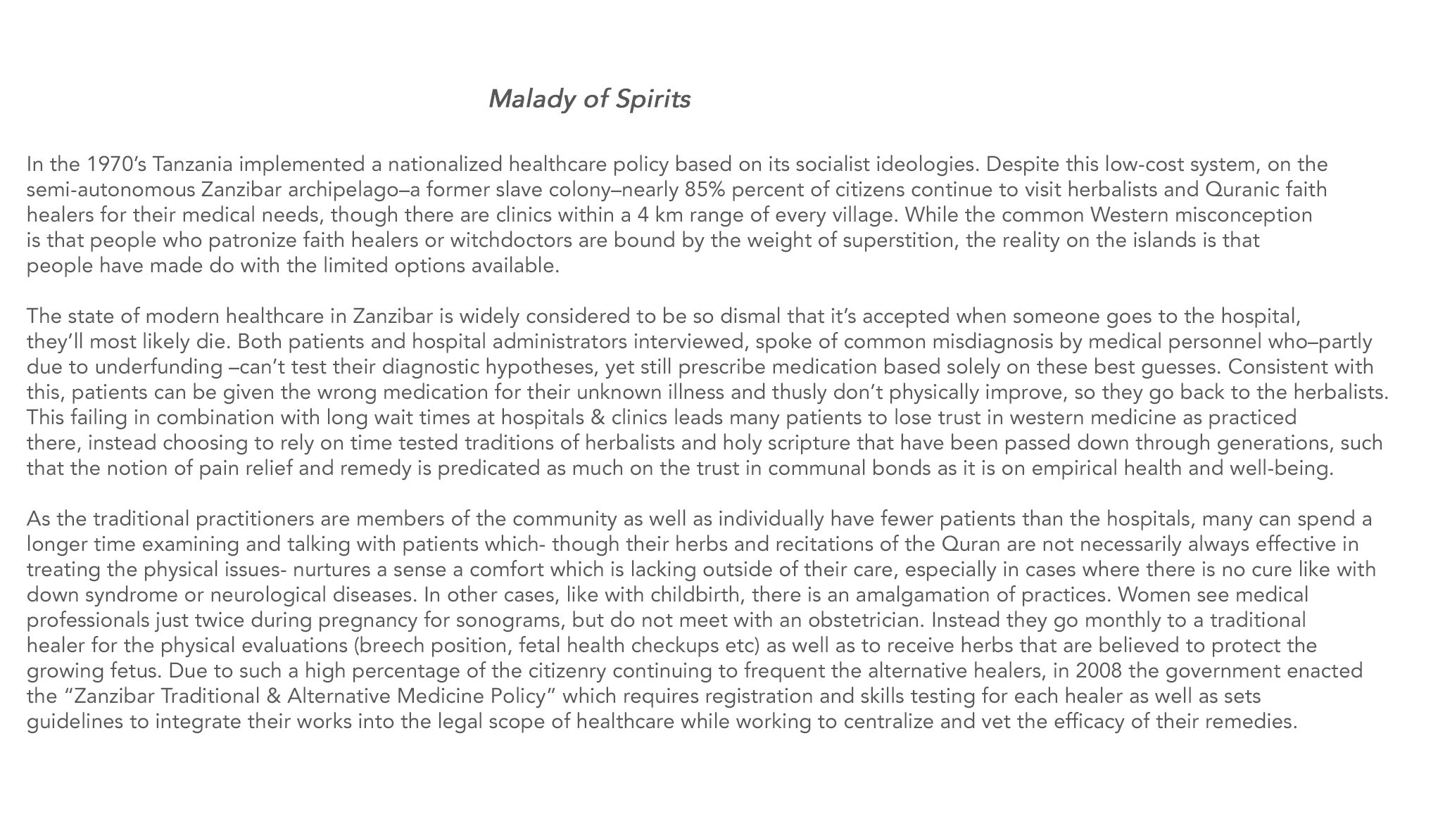
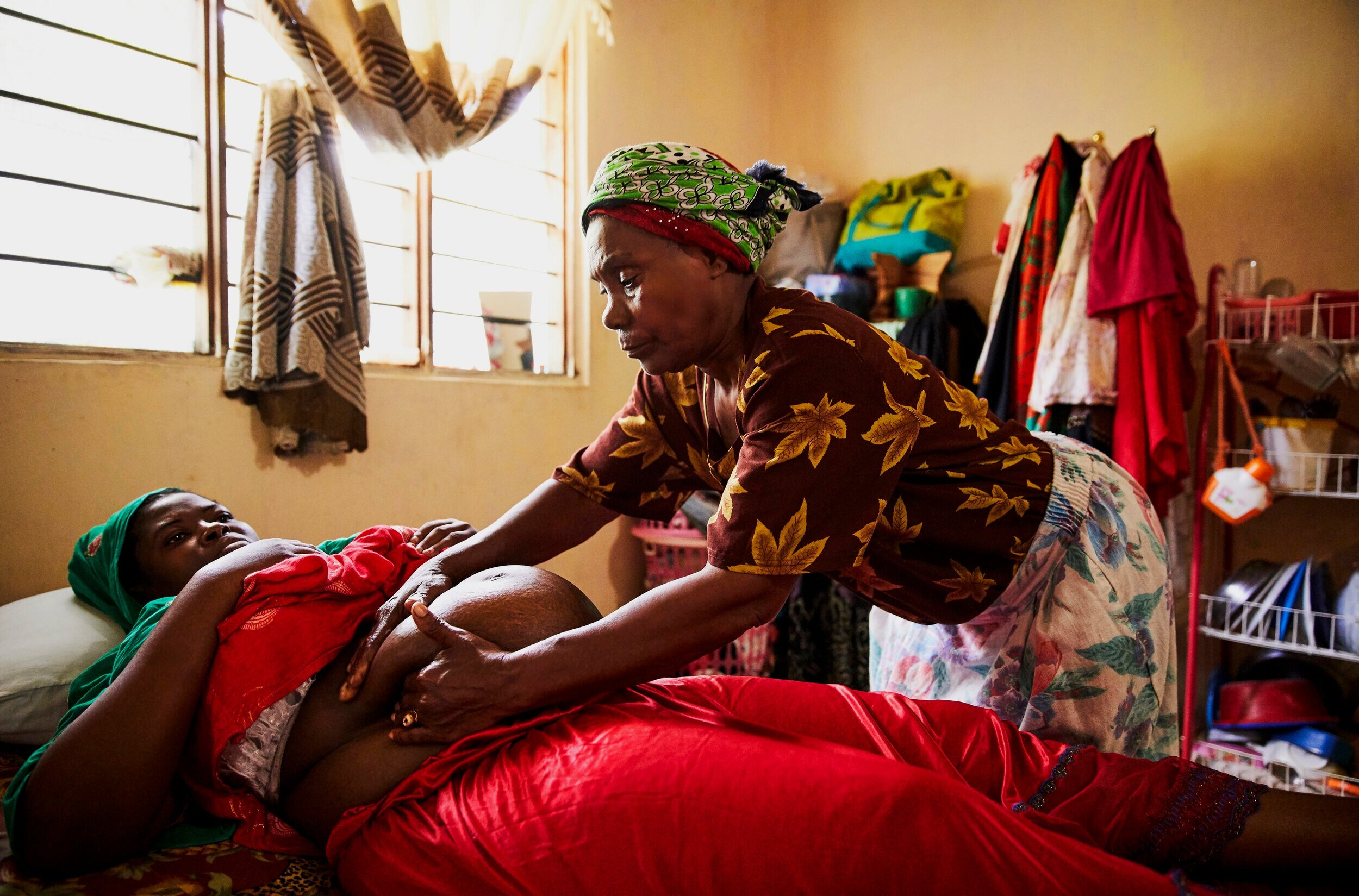
Traditional healer, Mwanahija Mzee, massages pregnant patient, Maryam Juma, 29. This is Maryam’s 5th pregnancy though 3 miscarried and 1 was stillborn, so she has no living children. Both she and the healer believe the reason she hasn’t been able to carry to a live birth is because a djinn (spirit) has attacked each child in utero. Maryam has also attempted to see western doctors at the government hospital, but as they have no machines or testing available to further investigate her uterus/cervix, they are at a loss as to the reason for her physical malady.
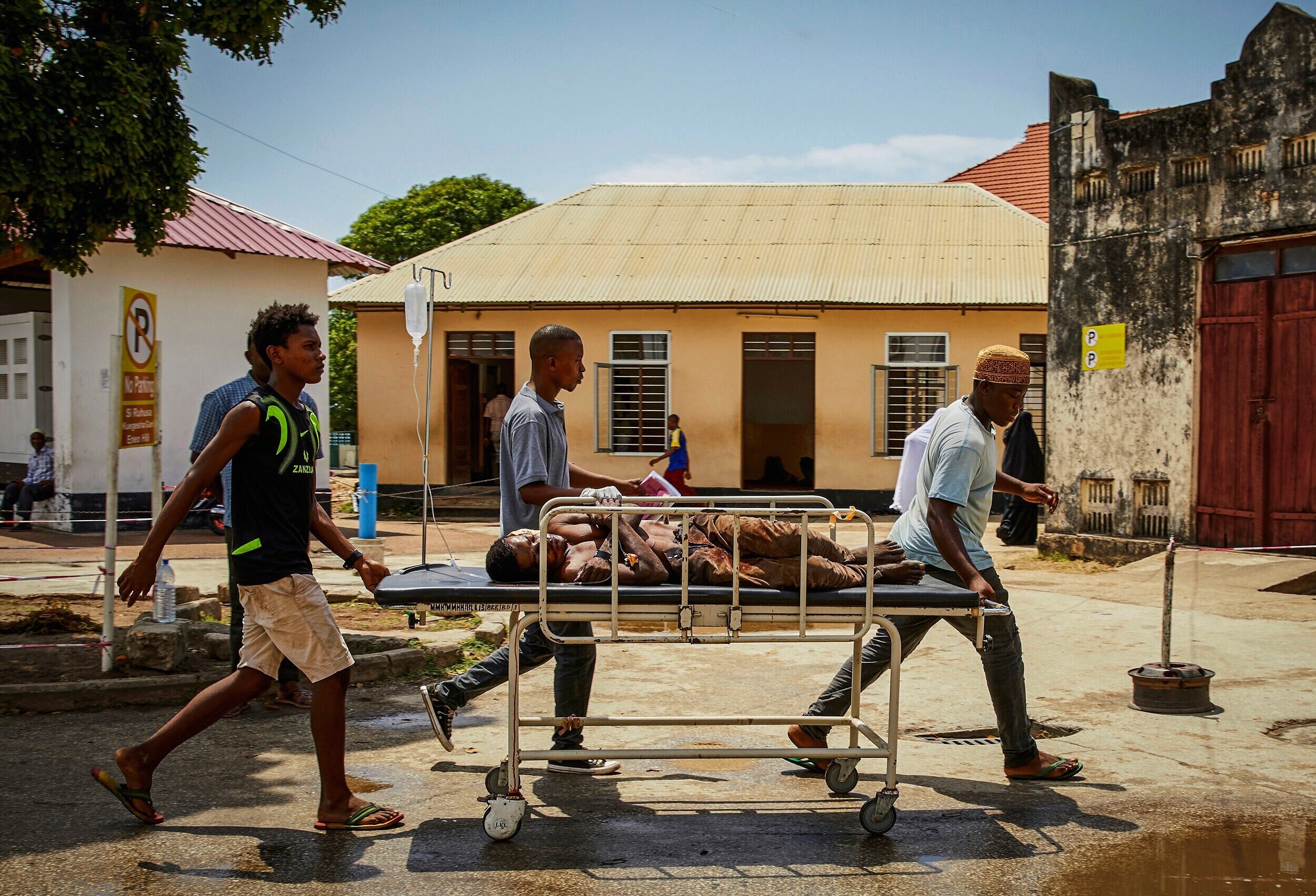
Male relatives move a gurney with a sick patient across the yard at the Mnazi Mmoja hospital.
At government hospitals in Zanzibar, everything- including bedsheets, daily meals, physical washing, and transporting of the patient to different departments-must be supplied by a patient’s support group versus hospital staff.
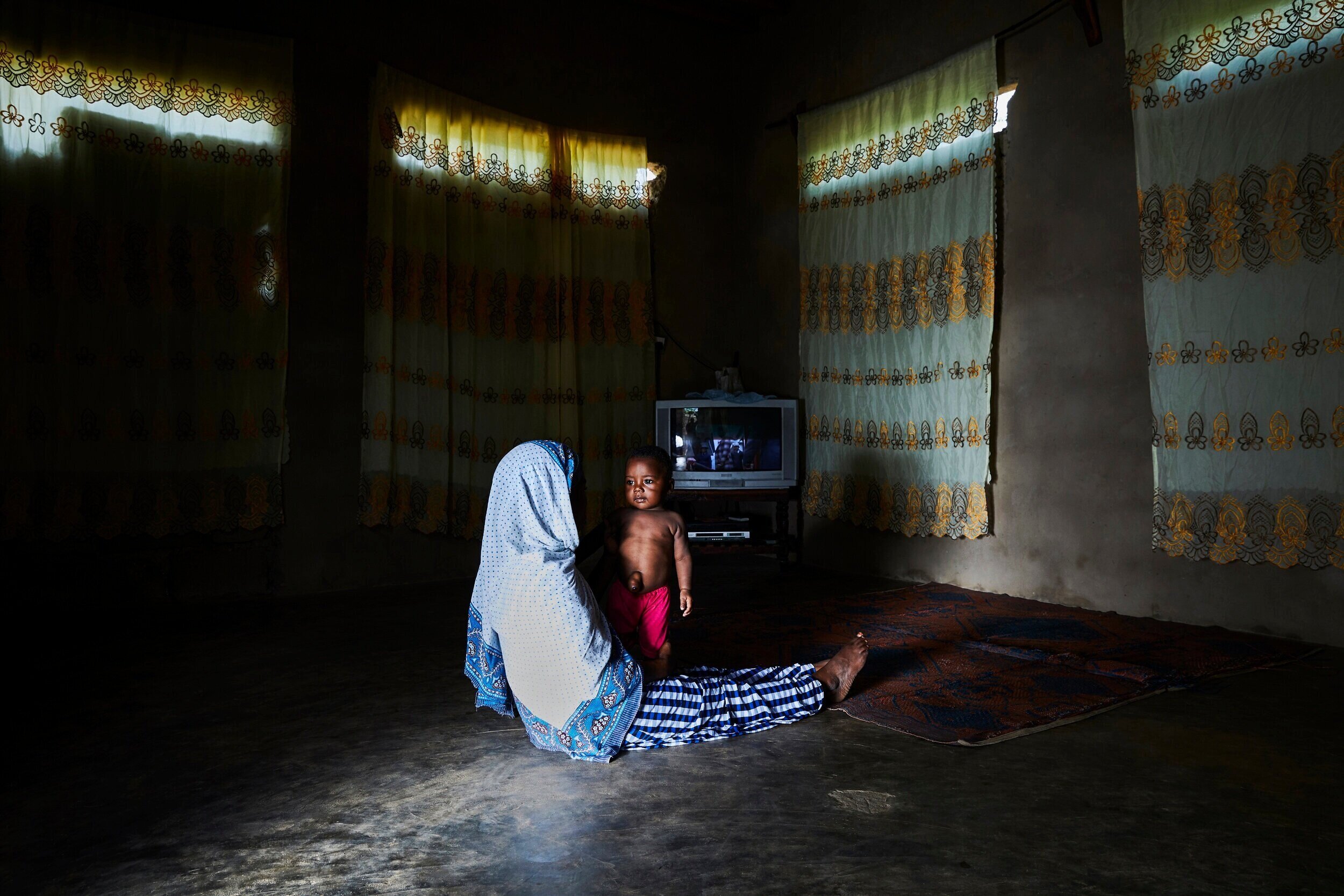
8 month old, Muhammad Ali, with his mother Nadra sit in the living room of their home. Muhammad suffers from physical pain resulting from an extreme incarcerated hernia (distended belly button as the intestines push through the still forming muscles). His mother brought him to a traditional healer to get herbs to alleviate the discomfort, which she says is helping. The mother initially took him to hospital, which recommended surgery, but Nadra is concerned her son will die there, as her first child did.
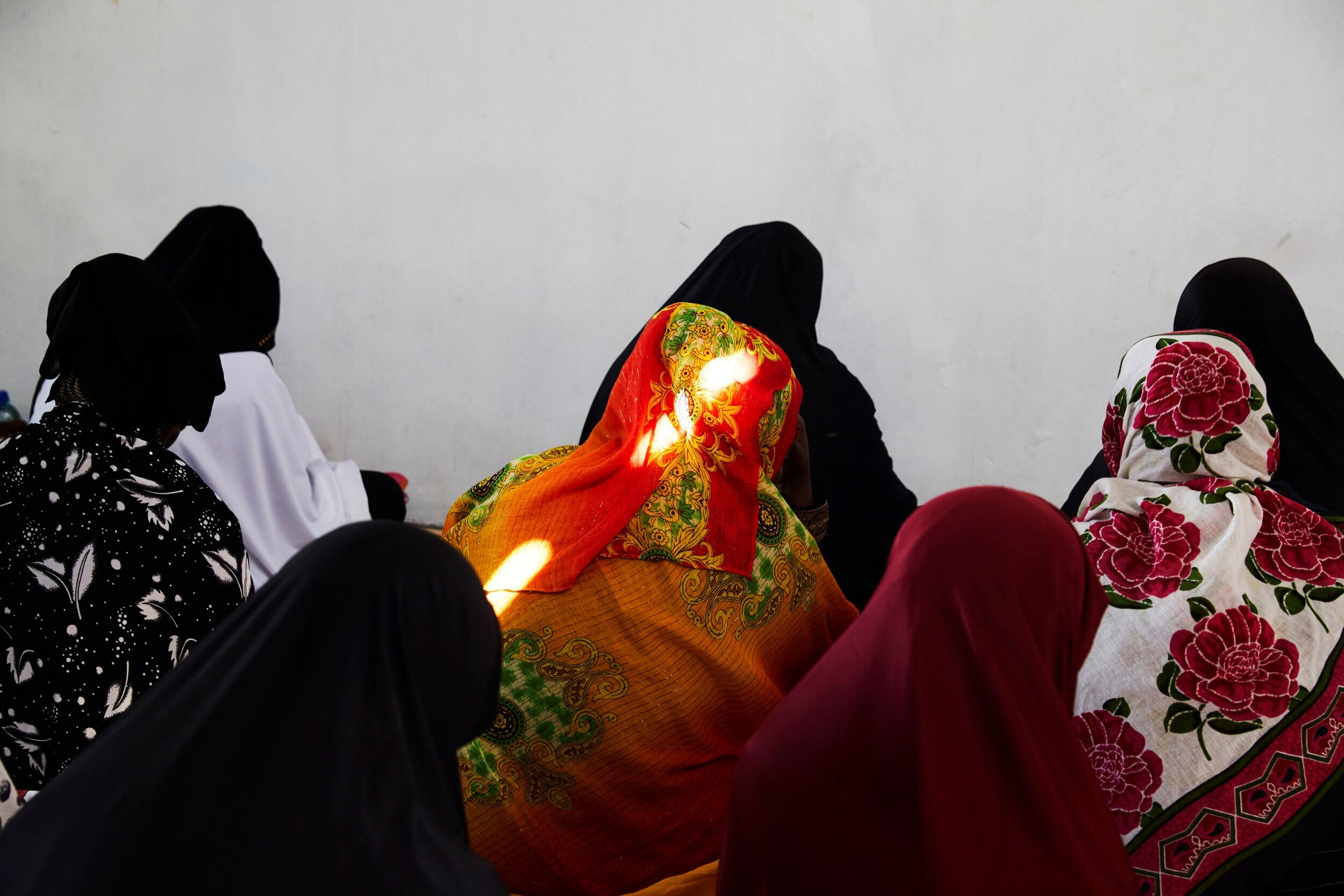
Muslim women chant religious dua’s (prayers) at the Shifaa Herbalist Clinic, where many hoped to be healed of physical or mental illnesses thought to be caused by djinn (spirits), through the recitation of the Quran
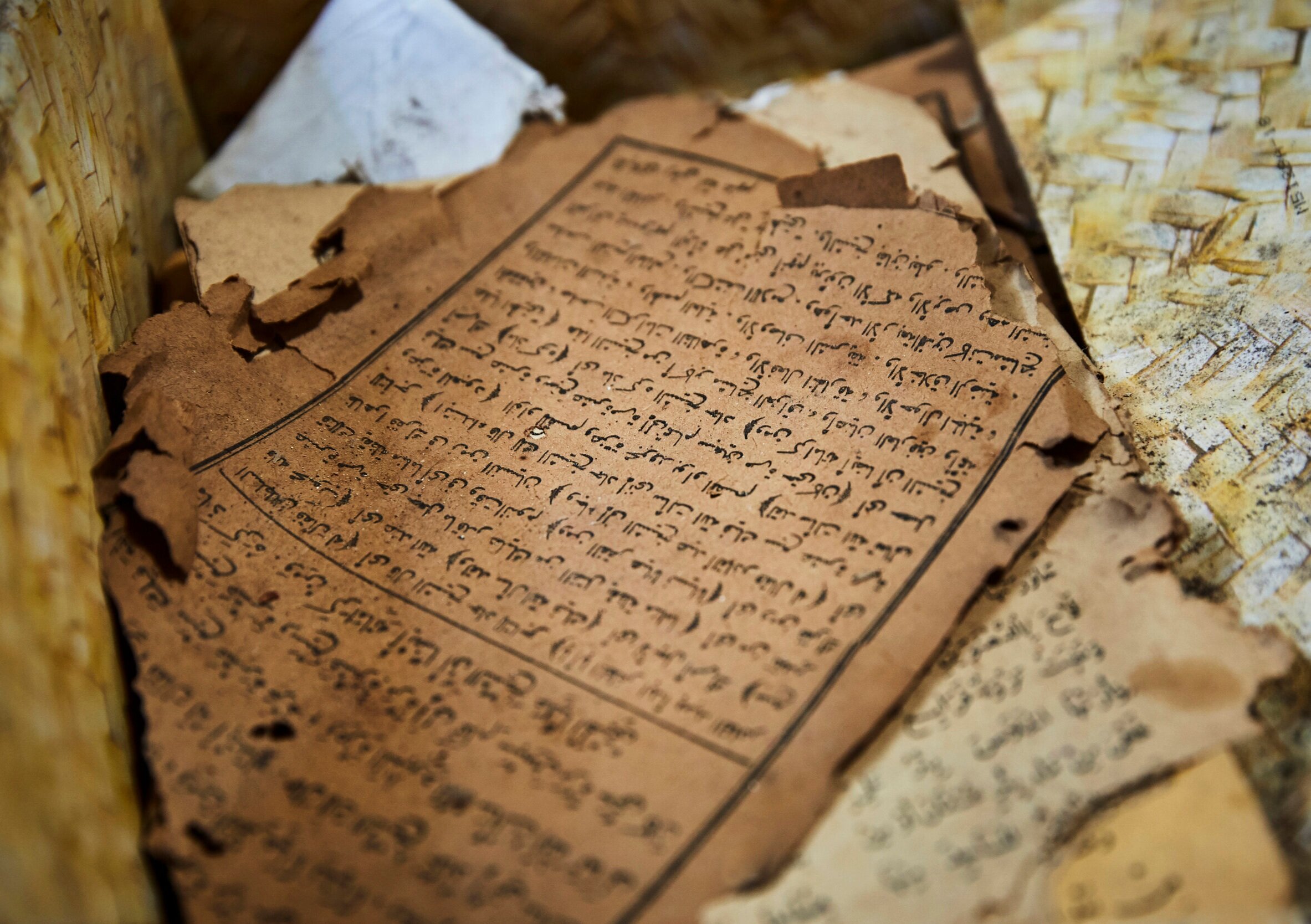
Worn pages of the Quran used in bestowing blessings by traditional healer, Mrisho Mohammed, in Jambiani village.
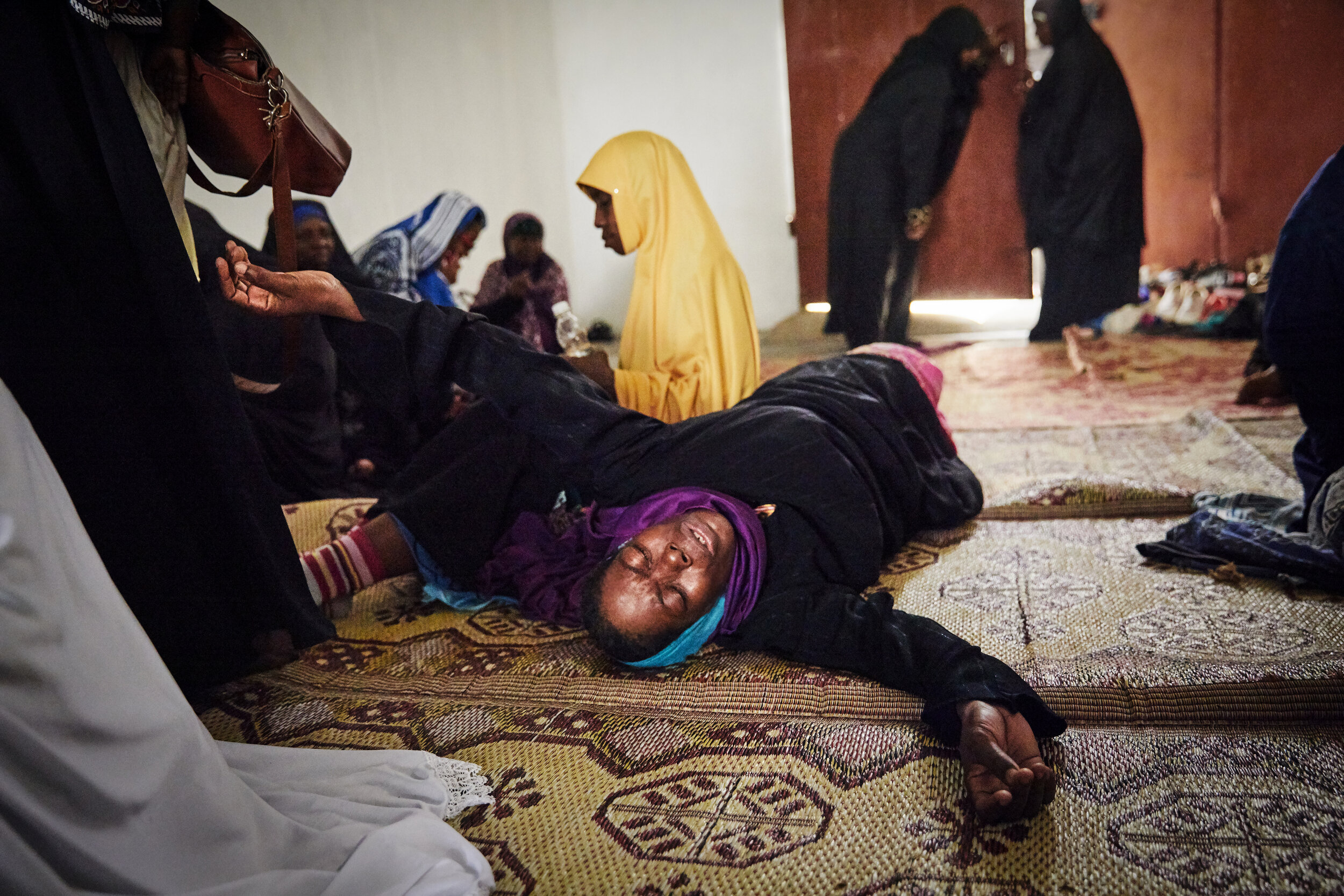
A woman writhes on the floor as she fights to release an apparent djinn possession (supernatural being that forces people to do its will) that is believed to be causing her stomach pains at the Shifaa Herbal clinic. The act of dispossession is said to be painful and can lead to running, screaming, or vomiting, etc while a Sheik recites words from the Quran, which is thought to act like acid to the djinn (as taught in Islam).
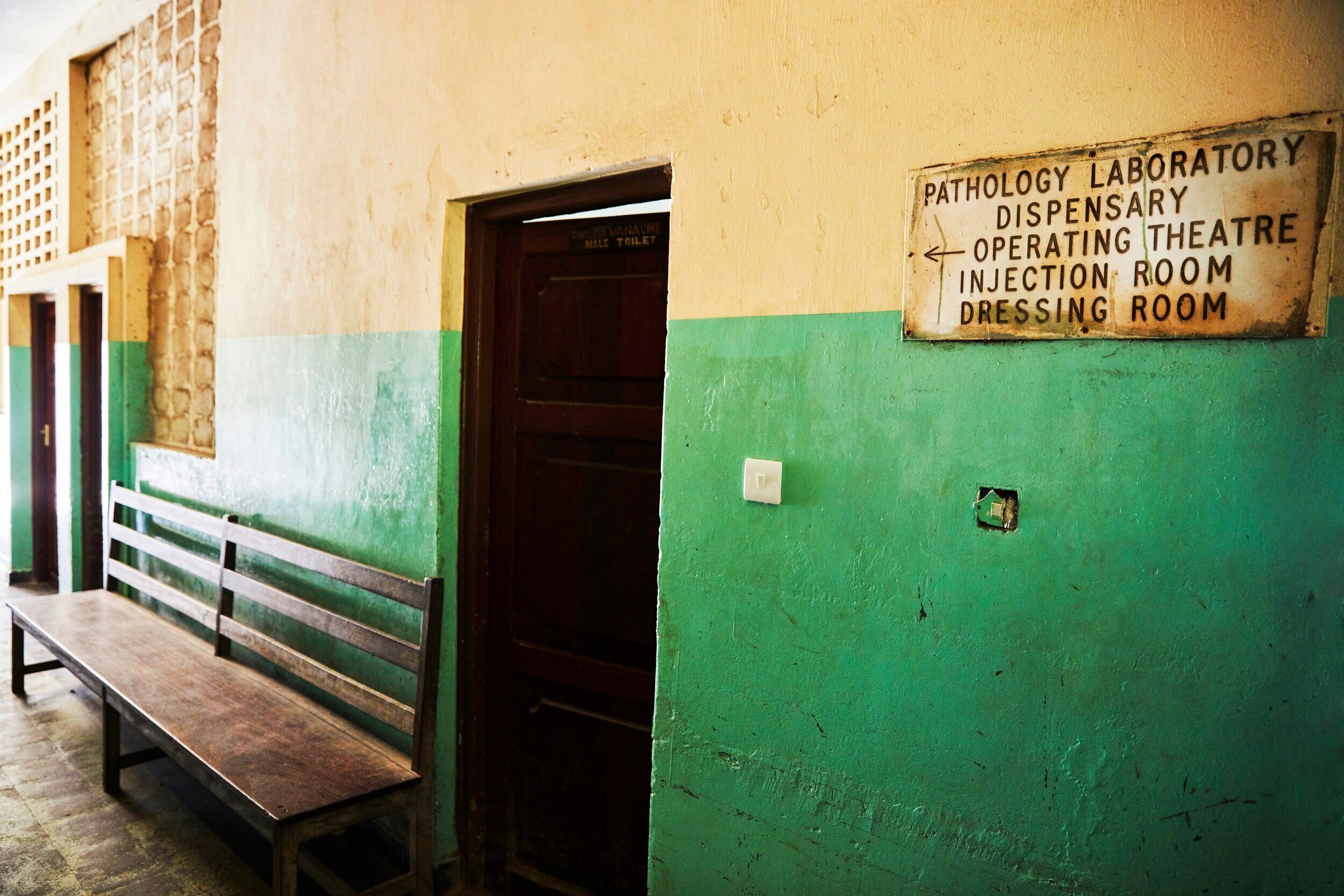
A sign giving directions at Mnazi Mmoja Hospital which is the largest government-funded hospital on the island.
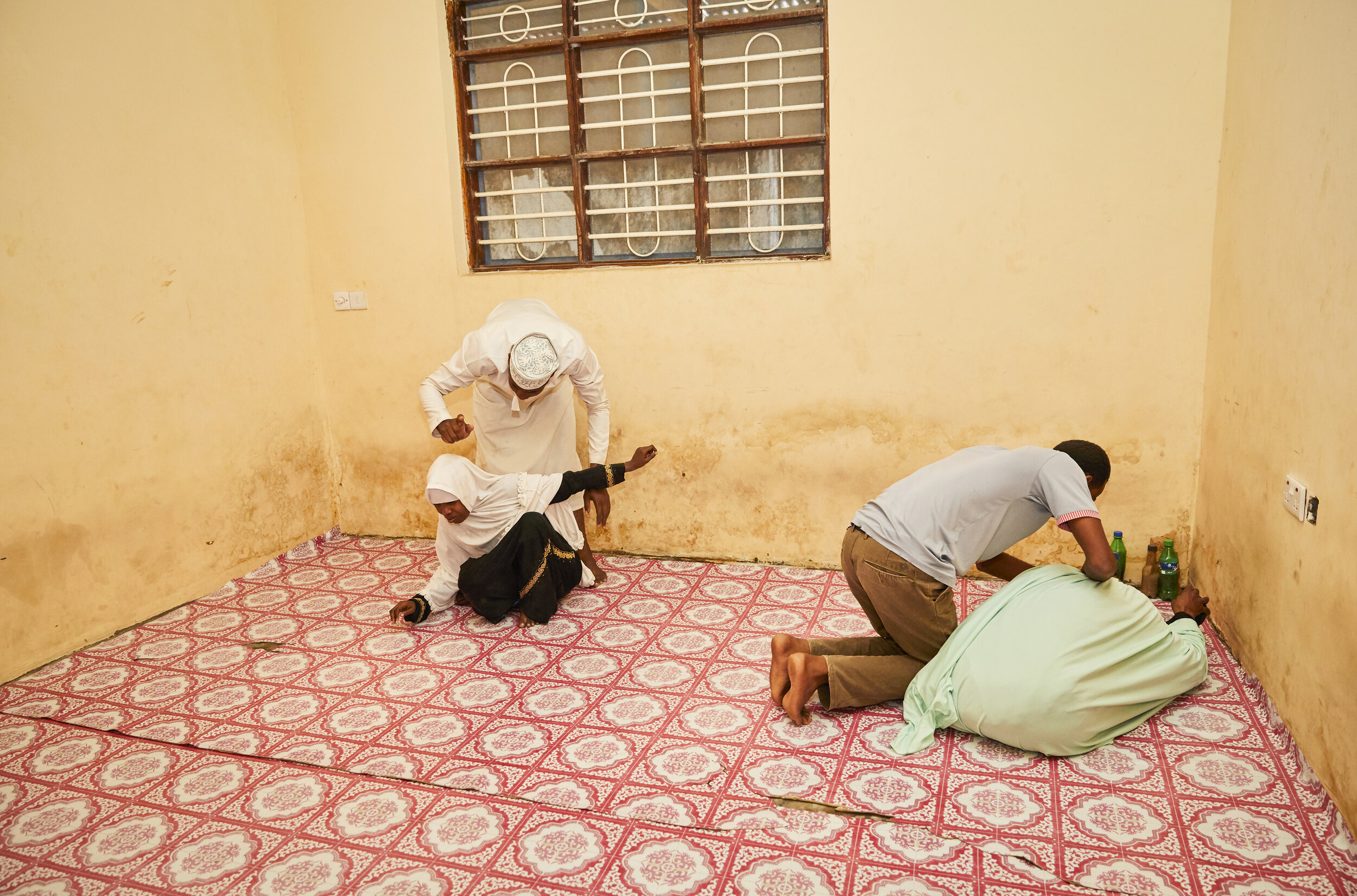
Two women believed to carry dark djinn (spirits) have private consultations with Sheikh Abdul Rahman & Sheikh Nsoor at the Shifaa herbal clinic in Zanzibar City, Zanzibar. In order to push the djinni out that is believed to be causing their illnesses, the Sheikhs physically hold the women and speak angrily to the djinn inside of them. It is thought that the Sheikhs have power bestowed on them by Allah, giving them special strength that the djinn are afraid of.
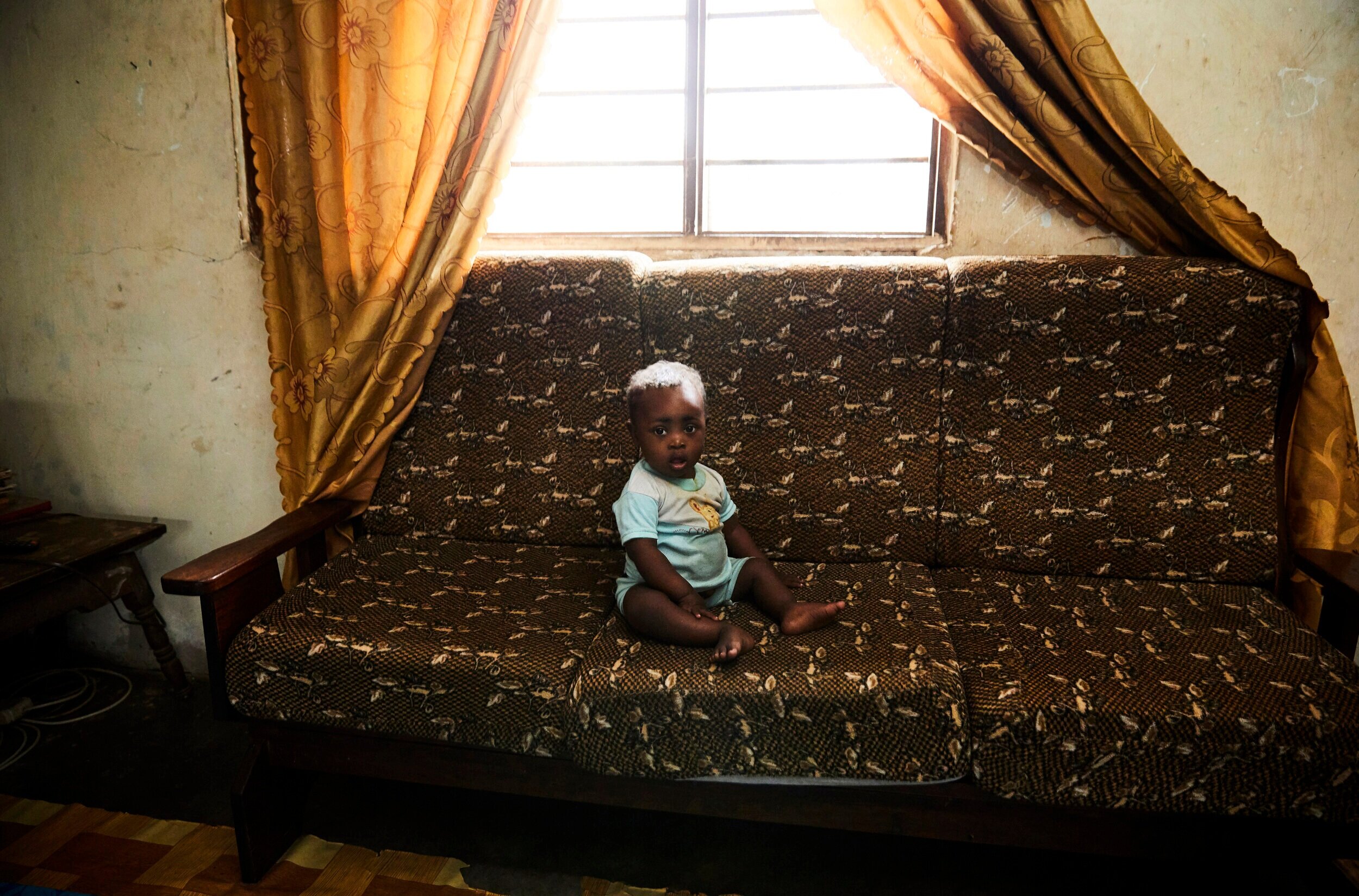
1 year old Nurdiin, born with Down Syndrome sits on the couch of his home. He is the youngest child of his 43-year-old mother, Salha Abdallah, who has 7 children in total including him. The two of them go twice weekly to Mwanahija Mzee’s traditional healing clinic to get the baby massages and teas that she believes help invigorate him. When Salha left the hospital after giving birth, the doctors there didn’t explain anything about the chromosomal disorder to her, so she does what she can to keep the child from becoming too listless.

Two assistant healers at Mwanahija Mzee’s traditional clinic, use newspapers to package correct portions of healing herbs and medicinal roots that will be given to patients later in the day. Tufaa Abeid (left) mainly acts as the pharmacist doling out specific herbal medications and Salama Mohammed (right), helps with smaller jobs like intake of patients.
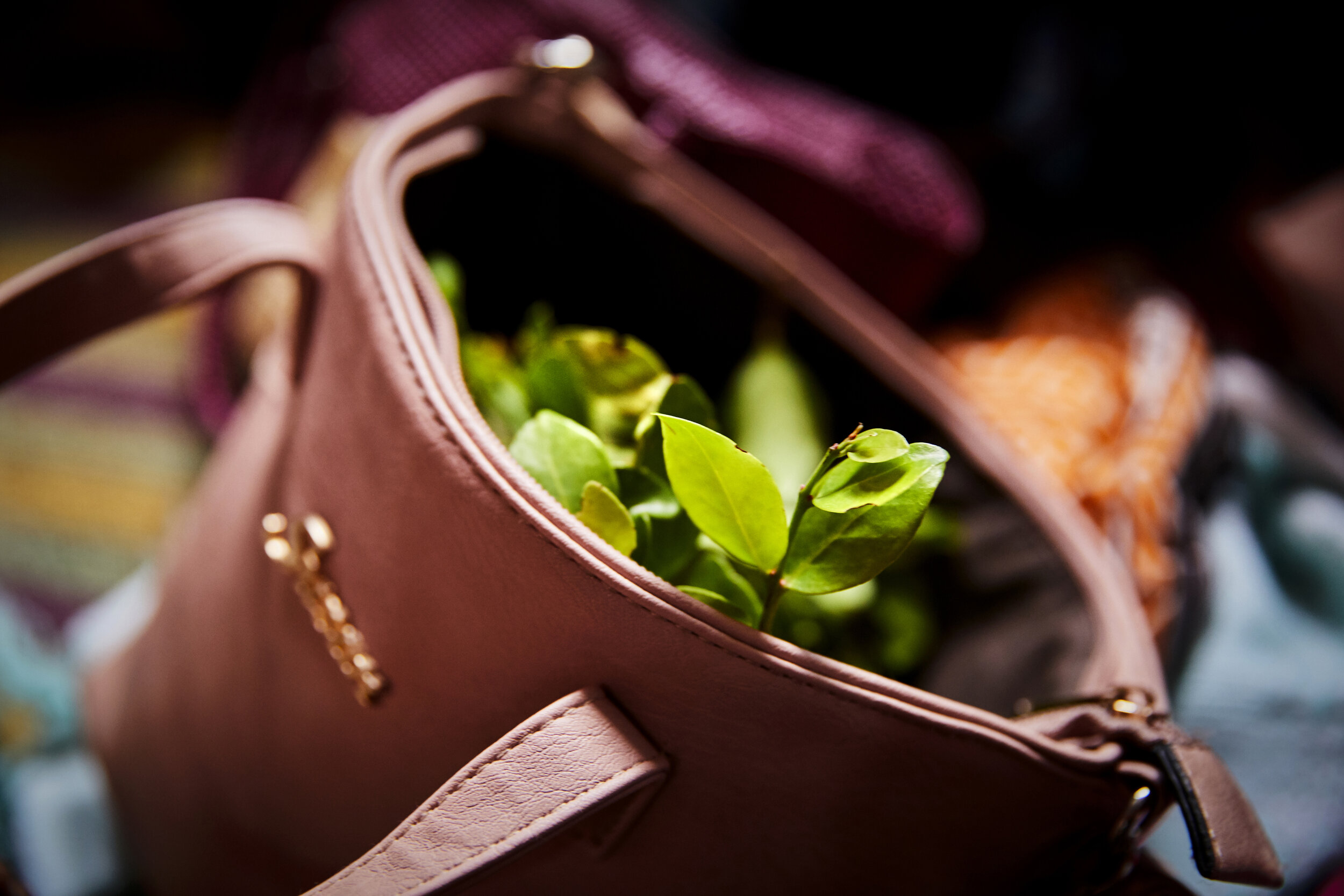
Medicine at the traditional healer, Mwanhija Mzee’s clinic usually takes the form of roots and leaves to later be boiled into a tea by her patients. They are often put directly into patient’s purses for transport as Zanzibar has recently switched to a no plastic bags island.

Infant, Ahee Bom, lays on a cushion in the hallway of his home where there is a slight breeze. Within weeks of his birth, the skin around his face and abdomen began to significantly darken and peel off in large strips. Mnazi Mmoja Hospital dermatologists said that nothing could be done and that the problem might clear on its own. His mother instead took him to the traditional healer, Mwanahija Mzee, who bathed him with 2 scrubs made of leaves from a medicinal plant she gathered. The infant is photographed here roughly 3 weeks after the process, and his skin appeared to be healed.
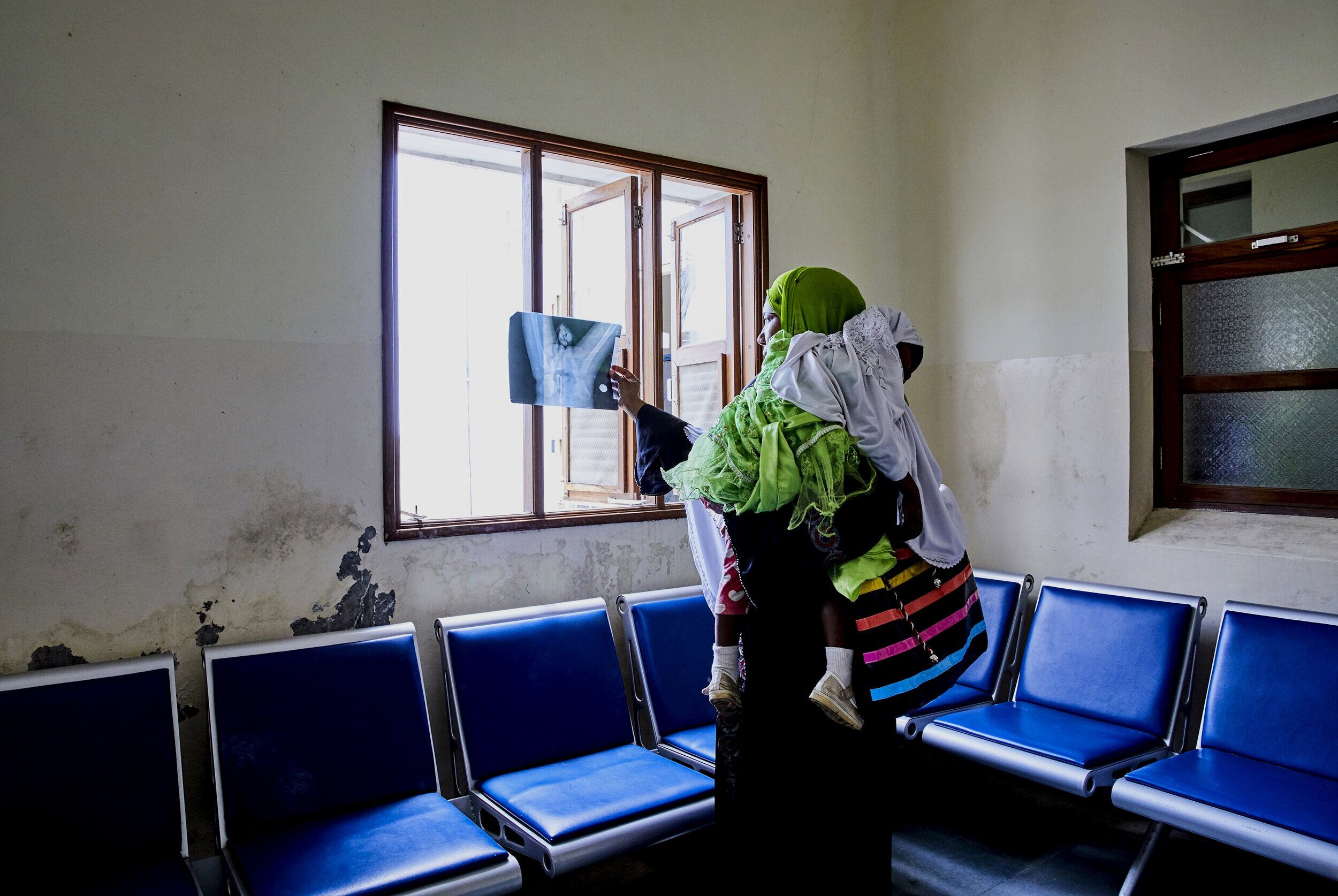
Mother, Fatma Hamad, holds her 2 yr old daughter, Khadija, while looking at the child’s x-rays at Mnazi Mmoja government hospital. When her daughter’s leg became paralyzed after a high fever one month prior, Fatma initially took her to the hospital. There, the doctor never physically examined the child, but after hearing her symptoms ordered an x-ray. When the x-ray (which would not show the likely nerve damage causing the paralysis) showed no problems in the bone structure, he dismissed the family.
The mother then went to a traditional healer to seek help, where it was concluded that the child has a djinn (spirit) possession, that must be causing the paralysis.
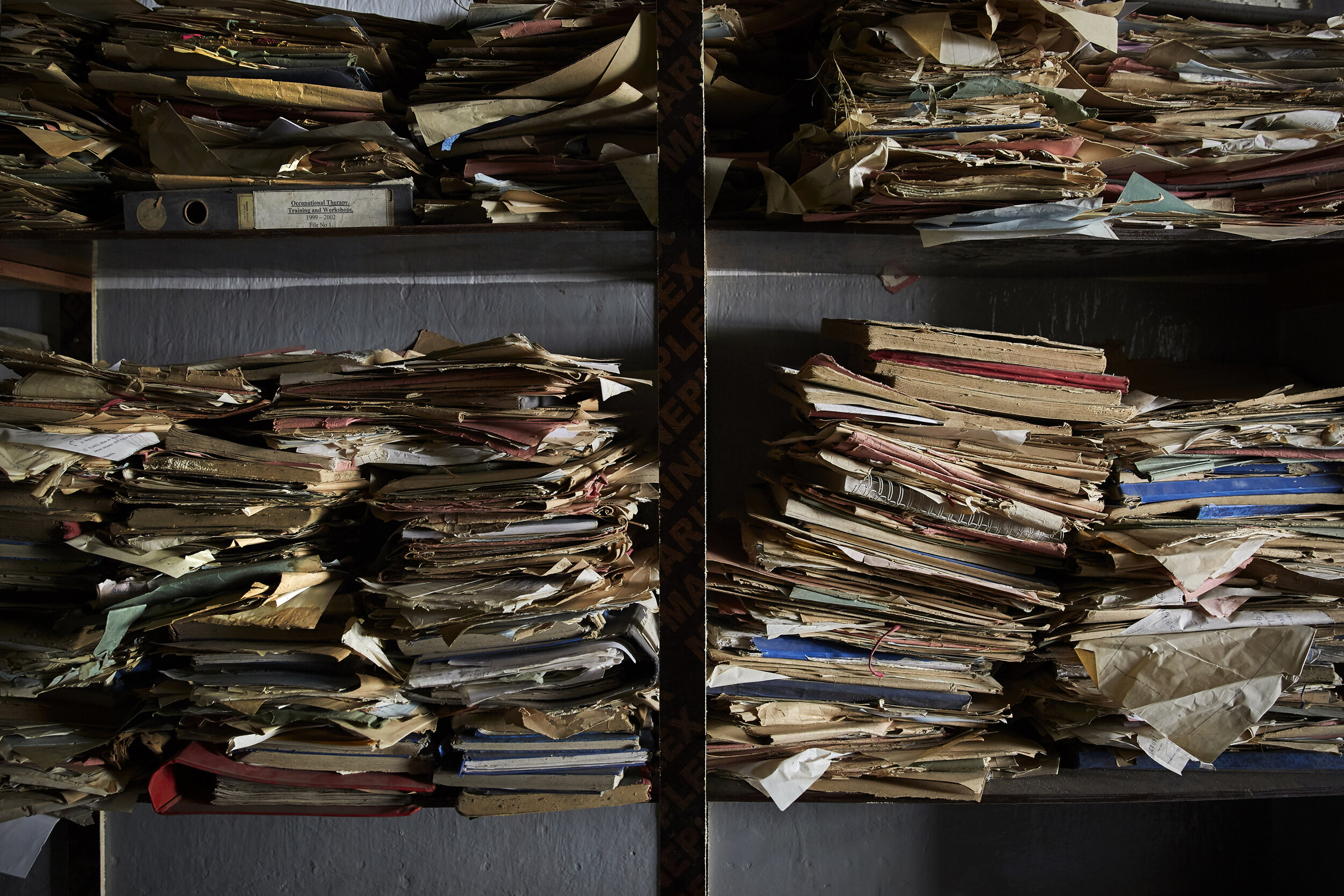
Hand-written patient files at Kidongo Chekundu Hospital, Zanzibar’s only psychiatric ward, which has no computers or filing system. All notes are written in longhand and stored on these shelves. These files date back roughly five years before they will be destroyed to make space for the new ones from incoming patients. Most families believe that mental illness is caused by djinn(spirit) possession, so rarely bring patients to the hospital until the situation is dire.

















A rooster walks amidst roots used in traditional healing at Mwanahija Mzee’s clinic in Zanzibar City, Tanzania
A woman moans as she attempts to have a heavy djinn (spirit) leave her body, while other women look on at the Shifaa Herbal clinic. People who go to the clinic believe that physical and mental illnesses are mainly due to the presence of /caused by djinn possession which creates a disturbance in their bodies, which is what is taught to them in the Muslim faith. The women go to Shifaa Herbal Clinic where a Sheik recites passages from the Quran which, it is hoped, will help restore the patient’s spiritual balance and drive the djinn from them.
Traditional healer, Mwanahija Mzee, massages pregnant patient, Maryam Juma, 29. This is Maryam’s 5th pregnancy though 3 miscarried and 1 was stillborn, so she has no living children. Both she and the healer believe the reason she hasn’t been able to carry to a live birth is because a djinn (spirit) has attacked each child in utero. Maryam has also attempted to see western doctors at the government hospital, but as they have no machines or testing available to further investigate her uterus/cervix, they are at a loss as to the reason for her physical malady.
Male relatives move a gurney with a sick patient across the yard at the Mnazi Mmoja hospital.
At government hospitals in Zanzibar, everything- including bedsheets, daily meals, physical washing, and transporting of the patient to different departments-must be supplied by a patient’s support group versus hospital staff.
8 month old, Muhammad Ali, with his mother Nadra sit in the living room of their home. Muhammad suffers from physical pain resulting from an extreme incarcerated hernia (distended belly button as the intestines push through the still forming muscles). His mother brought him to a traditional healer to get herbs to alleviate the discomfort, which she says is helping. The mother initially took him to hospital, which recommended surgery, but Nadra is concerned her son will die there, as her first child did.
Muslim women chant religious dua’s (prayers) at the Shifaa Herbalist Clinic, where many hoped to be healed of physical or mental illnesses thought to be caused by djinn (spirits), through the recitation of the Quran
Worn pages of the Quran used in bestowing blessings by traditional healer, Mrisho Mohammed, in Jambiani village.
A woman writhes on the floor as she fights to release an apparent djinn possession (supernatural being that forces people to do its will) that is believed to be causing her stomach pains at the Shifaa Herbal clinic. The act of dispossession is said to be painful and can lead to running, screaming, or vomiting, etc while a Sheik recites words from the Quran, which is thought to act like acid to the djinn (as taught in Islam).
A sign giving directions at Mnazi Mmoja Hospital which is the largest government-funded hospital on the island.
Two women believed to carry dark djinn (spirits) have private consultations with Sheikh Abdul Rahman & Sheikh Nsoor at the Shifaa herbal clinic in Zanzibar City, Zanzibar. In order to push the djinni out that is believed to be causing their illnesses, the Sheikhs physically hold the women and speak angrily to the djinn inside of them. It is thought that the Sheikhs have power bestowed on them by Allah, giving them special strength that the djinn are afraid of.
1 year old Nurdiin, born with Down Syndrome sits on the couch of his home. He is the youngest child of his 43-year-old mother, Salha Abdallah, who has 7 children in total including him. The two of them go twice weekly to Mwanahija Mzee’s traditional healing clinic to get the baby massages and teas that she believes help invigorate him. When Salha left the hospital after giving birth, the doctors there didn’t explain anything about the chromosomal disorder to her, so she does what she can to keep the child from becoming too listless.
Two assistant healers at Mwanahija Mzee’s traditional clinic, use newspapers to package correct portions of healing herbs and medicinal roots that will be given to patients later in the day. Tufaa Abeid (left) mainly acts as the pharmacist doling out specific herbal medications and Salama Mohammed (right), helps with smaller jobs like intake of patients.
Medicine at the traditional healer, Mwanhija Mzee’s clinic usually takes the form of roots and leaves to later be boiled into a tea by her patients. They are often put directly into patient’s purses for transport as Zanzibar has recently switched to a no plastic bags island.
Infant, Ahee Bom, lays on a cushion in the hallway of his home where there is a slight breeze. Within weeks of his birth, the skin around his face and abdomen began to significantly darken and peel off in large strips. Mnazi Mmoja Hospital dermatologists said that nothing could be done and that the problem might clear on its own. His mother instead took him to the traditional healer, Mwanahija Mzee, who bathed him with 2 scrubs made of leaves from a medicinal plant she gathered. The infant is photographed here roughly 3 weeks after the process, and his skin appeared to be healed.
Mother, Fatma Hamad, holds her 2 yr old daughter, Khadija, while looking at the child’s x-rays at Mnazi Mmoja government hospital. When her daughter’s leg became paralyzed after a high fever one month prior, Fatma initially took her to the hospital. There, the doctor never physically examined the child, but after hearing her symptoms ordered an x-ray. When the x-ray (which would not show the likely nerve damage causing the paralysis) showed no problems in the bone structure, he dismissed the family.
The mother then went to a traditional healer to seek help, where it was concluded that the child has a djinn (spirit) possession, that must be causing the paralysis.
Hand-written patient files at Kidongo Chekundu Hospital, Zanzibar’s only psychiatric ward, which has no computers or filing system. All notes are written in longhand and stored on these shelves. These files date back roughly five years before they will be destroyed to make space for the new ones from incoming patients. Most families believe that mental illness is caused by djinn(spirit) possession, so rarely bring patients to the hospital until the situation is dire.
